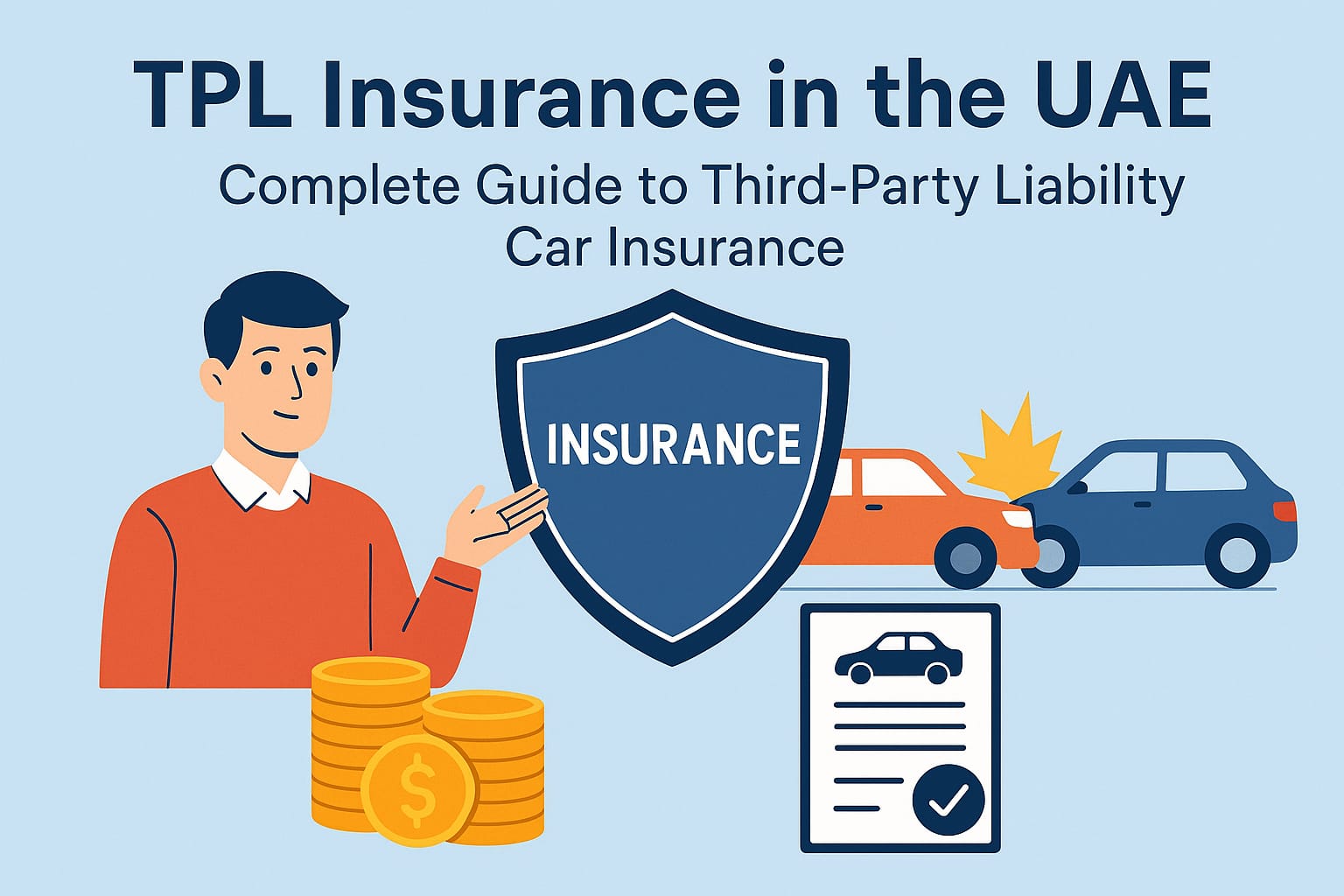If you’ve ever felt a bit puzzled by the jargon and car insurance terms surrounding auto policies, you’re not alone. Understanding car insurance meaning and various coverage types can seem complex at first. Understanding car insurance coverage doesn’t have to be like cracking a secret code. We’re here to help make it simpler for you.
In this blog, we’ll walk you through some of the key car insurance terms and explain motor insurance coverage options in a way that’s easy to grasp.
By the time you’re done reading, you’ll feel more confident and informed about what these terms really mean. Let’s dive in and unravel the world of car insurance together!
Common Car Insurance Terms
Before diving into specific coverage types, it’s helpful to understand the full form of car insurance and the basic car insurance coverage options available in the UAE market.
Liability Coverage
Liability coverage is the most important type of car insurance coverage in Dubai. It protects you from financial responsibility if you are found at fault in an accident that injures or damages another person’s property.
- Bodily injury liability (BI): BI liability covers the medical expenses and other costs related to injuries sustained by other people in an accident you cause.
- Property damage liability (PD): PD liability covers the cost of repairing or replacing property damaged in an accident you cause.
Comprehensive Coverage
Comprehensive motor insurance coverage protects your car from damage caused by events other than a collision, such as theft, vandalism, fire, hail, and falling objects.
Comprehensive coverage can also cover damage caused by natural disasters, such as floods, earthquakes, and hurricanes.
Collision Coverage
Collision coverage protects your car from damage caused by a collision with another vehicle or object. It can also cover damage to your car caused by an animal or a tree.
Understanding Car Insurance Full Form and Basic Coverage
When discussing the full form of car insurance, it’s important to note that comprehensive auto insurance policies in the UAE typically combine multiple coverage types. Insurance coverage for a car can include liability, comprehensive, collision, and personal injury protection, each serving a specific purpose in protecting you and your vehicle. Understanding these different types of car insurance coverage helps you select the right policy that matches your needs and budget.
Personal Injury Protection (PIP)
PIP coverage pays for your medical expenses, regardless of who is at fault in an accident. This can include things like doctor’s visits, hospital bills, and prescription drugs. PIP can also cover your lost wages and other expenses if you are injured in an accident and unable to work.
Car Insurance Premiums and Deductibles
Two fundamental car insurance terms that every policyholder should understand are premiums and deductibles, as they directly impact your insurance coverage for car costs.
Car Insurance Premium
A car insurance premium is the amount of money you pay to your insurance company each month to keep your policy active. The premium is based on several factors, including your age, driving history, the type of car you drive, and the coverage you choose.
Factors Influencing Premium Amounts:
- Age: Younger drivers typically pay higher premiums than older drivers, because they are more likely to be involved in accidents.
- Driving history: Drivers with a clean driving record typically pay lower premiums than drivers with a history of accidents or tickets.
- Type of car: The type of car you drive can also affect your premium. Cars that are more expensive to repair or replace, such as luxury cars, typically have higher premiums.
- Coverage: The amount of coverage you choose will also affect your premium. More comprehensive coverage will typically have a higher premium than less comprehensive coverage.
Car Insurance Deductible
A car insurance deductible is the amount of money you have to pay out of pocket before your insurance company will cover the cost of a claim. For example, if you have a AED 500 deductible and you total your car in an accident, you will have to pay the first AED 500 of the repairs, and your insurance company will pay the remaining amount.
The higher your deductible, the lower your monthly premiums will be. This is because you are assuming more of the financial risk in the event of a claim. However, it is important to make sure you can afford to pay the deductible if needed.
Underinsured/Uninsured Motorist Coverage
Uninsured motorist coverage (UMC) is an insurance policy that pays for your medical expenses and other damages if you are injured in an accident caused by an uninsured or underinsured driver. Uninsured drivers are those who do not have car insurance, while underinsured drivers are those who have car insurance but whose policy limits are not enough to cover the damages.
UMC is an important coverage to have because it can help protect you financially if you are injured in an accident caused by an uninsured or underinsured driver. Without UMC, you could be responsible for paying for your own medical expenses and other damages, which could be very costly.
UMC can also cover you if you are injured in an accident caused by a driver who has insurance, but whose policy limits are not enough to cover your damages.
No-fault Insurance
No-fault insurance is a type of car insurance system in which each driver’s insurance company pays for their own losses, regardless of who is at fault for the accident. No-fault insurance is designed to simplify the claims process and reduce the number of lawsuits filed after car accidents.
In a no-fault state, you will not be able to sue the other driver for their negligence, even if they were at fault for the accident. Instead, you will file a claim with your own insurance company, and they will pay for your losses up to your policy limits.
Discounts and Endorsements
Common Car Insurance Discounts
Car insurance companies offer a variety of discounts to their policyholders. Some of the most common discounts include:
- Safe driver discounts: available to drivers with a clean driving record. The longer you go without a ticket or accident, the higher the discount you may qualify for.
- Multi-policy discounts: If you have multiple policies with the same insurance company, you may be eligible for a discount. This could include things like auto and homeowners insurance, or auto and renters insurance.
- Good student discounts: Students who maintain a certain Grade Point Average (GPA) may be eligible for a discount on their car insurance. The requirements vary by insurance company, so be sure to ask.
- Anti-theft discounts: If you have an anti-theft device installed in your car, you may be eligible for a discount. This could include things like car alarms, immobilisers, and tracking devices.
- Pay-in-full discounts: If you pay your car insurance premium in full upfront, you may be eligible for a discount. This is because insurance companies typically charge a fee for monthly payments.
- Loyalty discounts: If you have been with the same insurance company for a certain period of time, you may be eligible for a discount.
- Senior discounts: Drivers who are over a certain age may be eligible for a discount on their car insurance. The age requirement varies by insurance company.
- Fleet discounts: If you own multiple cars, you may be eligible for a fleet discount. This is typically a larger discount than the multi-policy discount.
Car Insurance Endorsements
An insurance endorsement is a modification to your car insurance policy that adds or removes coverage. Endorsements can be used to tailor your coverage to your specific needs and budget.
Terminology for Filing Claims and Policy Management
Claim Process Terminology
- Reporting a claim is the initial notification to the insurance company that a loss has occurred. This can be done by phone, online, or in writing.
- Filing a claim is the formal submission of documentation to the insurance company to support the reported loss. This documentation typically includes a claim form, estimates or invoices for repairs or replacement, and photos of the damage.
Policy Management Terms
- Renewal is the process of extending the coverage of an insurance policy for an additional period.
- Cancellation is the termination of an insurance policy before the end of the policy period.
- Making policy changes can include adding or removing coverage, changing the deductible, or updating your contact information.
Here are some additional terms that you may encounter when filing a claim or managing your policy:
- Claimant: The person who is filing the claim.
- Insurance company: The company that is providing the insurance coverage.
- Adjuster: A person the insurance company hires to investigate claims and determine the amount of compensation owed.
- Deductible: The amount of money the policyholder must pay out of pocket before the insurance company begins to pay for a claim.
- Copayment: A percentage of the cost of repairs or replacement that the policyholder must pay.
- Exclusion: A condition or event that is not covered by the insurance policy.
- Waiver: A provision in the insurance policy that removes or limits coverage for a certain condition or event.
Conclusion
And there you have it! We hope this blog has shed light on some important car insurance terms that might have seemed confusing at first. Remember, understanding these car insurance terms can go a long way toward helping you make informed decisions about your coverage and choose the right policy for your needs. Whether comprehending what “deductibles” are, understanding the meaning of car insurance, or grasping the concept of “premiums,” having a good grasp on these car insurance terms empowers you as a savvy insurance consumer.
As you continue your journey, don’t hesitate to contact insurance experts or resources to deepen your understanding even more. Car insurance doesn’t have to be a maze of unfamiliar terms – armed with knowledge, you’re better prepared to navigate the insurance landscape with confidence.







